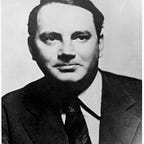The Chelsea Hotel: “An Old Place with Great Big Rooms” - Suite #829
Thomas Wolfe first moved to New York City after leaving Harvard in the Fall of 1923. During the fourteen years he lived in NYC, he resided in eleven different apartments- at one point just simply moving down the block. In September of 1937, after an extended visit spending much of his Summer in a cabin in Oteen, NC, Thomas Wolfe left Asheville for the final time, making his way back to NYC. He soon left his 14th-floor apartment at 865 First Avenue and lived in a few different hotels before settling in late October at 222 West 23rd Street in the Chelsea Hotel- suite #829.
Constructed in 1884, the Chelsea initially started as one of the city’s first apartment cooperatives. A shift in preference toward private housing and the availability of newer housing in Upper Manhattan bankrupted the Chelsea by the beginning of the twentieth century. Just a few years later, in 1905, it reopened as a hotel and its bohemian reputation began to take shape. As a renowned New York landmark, for over a century the Chelsea has served as a hangout and haven for artists, authors, musicians, and actors. Seeking inspiration and a place to create, the Hotel sheltered Mark Twain, Tennessee Williams, Jack Kerouac, Stanley Kubrick, Mitch Hedberg, Jane Fonda, Uma Thurman, Jim Morrison, Janis Joplin, Bob Dylan, Sid Vicious, and Jimi Hendrix to name a few.
In her work, Thomas Wolfe: When do the Atrocities Begin? Joanne Marshall Mauldin provides a glimpse of Wolfe’s new digs in suite #829. The apartment was:
. . . an eighth-floor corner suite costing $138 a month. It was gloomy and shabby, but with twelve-foot ceilings, there was little danger of him cracking his head. There were several tall windows overlooking West Twenty-third Street. He located his three packing crates in the oversized front room, claimed another large room as his sleeping area, and placed Joan Lanier, his secretary, in the smallest room. In the front room, he also put the scarred library table he used as a desk and on it a bronze lamp . . . a gift from Mrs. Bernstein. And he placed his crammed bookcase here, his cabinet radio, and two upholstered armchairs. He sometimes used the fireplace’s elaborate hand-carved mantel as a stand-up workspace. The kitchenette was of little value since he almost never cooked. Nonetheless it served a purpose when he reverted to a practice from younger days — composing atop the refrigerator. In the large bathroom, the commode was installed on a pedestal and thus dubbed the Throne Room.
Having severed ties with his publishing company, Charles Scribner’s Sons, Wolfe faced an uncertain time as he began searching for a new publisher. Now focused on his third book, his time at the Chelsea consisted of long days writing and socializing with a few of his neighbors, including Edgar Lee Masters, author of Spoon River Anthology, whom Wolfe greatly admired. Signing a contract with his new publisher, Harper and Brothers, at the end of December 1937, Wolfe continued to write feverishly from his suite in the early months of 1938. Turning a lengthy manuscript draft over to his new editor, Edward Aswell, Wolfe left the Chelsea on May 17th and headed west to lecture at Purdue University. It would be the last time he saw the Chelsea and New York. After an extended excursion out west, Wolfe fell gravely ill. He passed away at Johns Hopkins Hospital on September 15, 1938, from Tubercular Meningitis. Following his death, his brother Fred Wolfe traveled to NYC to retrieve his belongings from suite #829. Today, these artifacts, including a shabby armchair, radio, library table, and other personal effects, are on display in the Thomas Wolfe Memorial’s exhibit hall.
In the decades following Wolfe’s death, the Chelsea’s reputation as a mecca for budding stars and artists grew. The building, however, became more threadbare and derelict as the years passed. By 2011 it stood mostly empty, and at that time new owners purchased the building with plans for renovations and updates. Considering the numerous famous faces that passed through the halls and doors of the old hotel, it’s not surprising many of the interior doors were sold at auction in 2018. A former guest and admirer of the Chelsea, a philanthropist and photographer from Boston, purchased several dozen of the doors, including those from Wolfe’s suite, all for a whopping $403,000! Thomas Wolfe’s doors alone went for $9,500.
For more information on the Chelsea, visit: https://www.vanityfair.com/culture/2013/10/chelsea-hotel-oral-history and https://www.wsj.com/articles/when-the-chelsea-hotels-doors-were-auctioned-off-these-homeowners-came-knocking-11616074522
